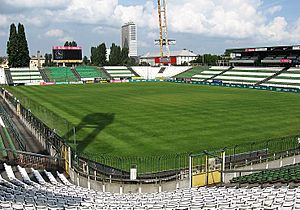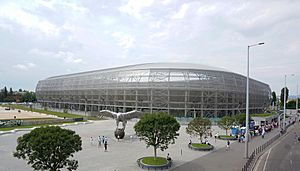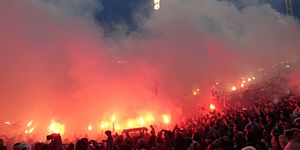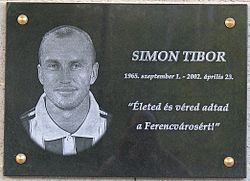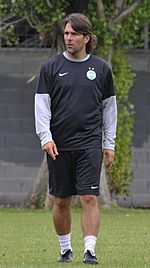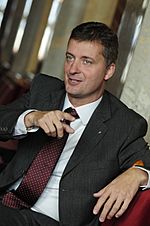Ferencvárosi TC facts for kids
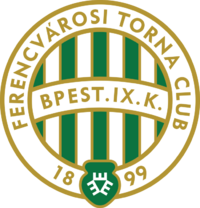 |
||||
| Full name | Ferencvárosi Torna Club | |||
|---|---|---|---|---|
| Nickname(s) | Ferencváros, FTC and Fradi, zöldek (The greens) | |||
| Short name | FTC | |||
| Founded | 3 May 1899 | |||
| Ground | Ferencváros Stadion, Budapest | |||
| Capacity | 23,700 | |||
| President | Gábor Kubatov | |||
| Head coach | Robbie Keane | |||
| League | NB I | |||
| 2024–25 | NB I, 1st of 12 (champions) | |||
|
||||
Ferencvárosi Torna Club, often called Ferencváros (Hungarian: [ˈfɛrɛnt͡svaːroʃ]), Fradi, or FTC, is a famous Hungarian professional football club. It is based in Ferencváros, a district in Budapest. The team plays in the Nemzeti Bajnokság I, which is the top football league in Hungary.
Ferencváros was started in 1899 by Ferenc Springer and some people from the local area. The club has won many titles in Hungary, including the Nemzeti Bajnokság I 36 times, the Magyar Kupa 24 times, and the Szuperkupa 6 times. These are all records for Hungarian football!
On the international stage, they won the Inter-Cities Fairs Cup in 1965. They beat Juventus 1–0 in the final. They also reached the finals of the same competition in 1968 and the European Cup Winners' Cup in 1975.
Ferencváros is best known for its men's football team, which is the most popular team in Hungary. But it's actually a multi-sport club with many other successful teams. These include women's football, women's handball, men's ice hockey, and men's water polo.
The club's colors are green and white. Their mascot is a green eagle, which is why they are sometimes called The Green Eagles.
Contents
- Club History: How Ferencváros Began
- Club Identity: Colors and Nicknames
- Ferencváros Stadium: Home Ground History
- Club Ownership and Leadership
- Ferencváros Fans and Rivalries
- Club Honours: Trophies and Achievements
- Club Records: Top Players
- Players: Meet the Team
- Non-Playing Staff: Who Runs the Club
- More About Ferencváros
- See also
Club History: How Ferencváros Began
Ferencvárosi TC was founded on May 3, 1899, by people living in the 9th district of Budapest, called Ferencváros. Since 1901, Ferencváros has almost always played in the Nemzeti Bajnokság I, Hungary's top league. They only spent three seasons (2006-2009) in a lower league due to financial issues. However, they were promoted back to the first division in 2009.
Ferencváros is the most successful Hungarian team, both in Hungary and in international competitions. They won the 1964–65 Inter-Cities Fairs Cup and have won the Nemzeti Bajnokság I 36 times and the Magyar Kupa 24 times.
The club has also played in major European tournaments. They were the first Hungarian club to qualify for the renewed UEFA Champions League in the 1995–1996 season. They have also played in the group stages of the 2004–05 UEFA Cup, Europa League, and Champions League in recent years.
The football part of the club started on December 3, 1900. Their first official championship match was on April 21, 1901, where they lost 5–3. Borbás Gáspár, who was 17, scored Ferencváros' first official goal. Their first win came on June 16, 1901, when they beat Budapesti SC 5–1.
Ferencváros played its first international match on March 25, 1901. On May 5, they won their first international game against Old Cricketer (5–0). In this game, players wore the first club badge. It had five green and four white stripes and three "E" letters. These letters stand for the club's motto: Morality, Strength, Understanding.
In 1903, Ferencváros won its first championship title. They won more titles in 1905, 1906/07, 1908/09, and 1909/10. On February 12, 1911, Ferencváros opened its new stadium on Üllői Road, where they still play today. Imre Schlosser scored the first goal in the new stadium. In 1911, the club won its third championship in a row, staying unbeaten for 21 matches.
In 1913, Ferencváros won both the championship title and the Hungarian Cup for the first time. When World War I started in 1914, many players had to join the military, and some never returned.
Club Identity: Colors and Nicknames
The club's main colors are green and white. The club badge has nine stripes, five green and four white. These stripes represent the 9th district of Ferencváros, Budapest, where the club was founded. The three "E" letters on the badge stand for the club's motto: Erkölcs, Erő, Egyetértés, which means "Morality, Strength, Understanding" in English.
Club Name Changes Over Time
Ferencvárosi TC has had a few different names throughout its history:
- 1899–1950: Ferencvárosi Torna Club
- 1950–1951: ÉDOSZ SE
- 1951–1956: Kinizsi
- 1956–present: Ferencvárosi Torna Club
Team Kit Sponsors
Here's a look at the companies that have made and sponsored Ferencváros's kits over the years:
| Period | Kit manufacturer | Shirt sponsor |
|---|---|---|
| 1979−1987 | Adidas | Márka |
| 1987–1990 | Pepsi | |
| 1990–1991 | Hargita Kft. | |
| 1991–1992 | Postabank RT | |
| 1992–1993 | Umbro | |
| 1993–1995 | West | |
| 1995–1996 | Adidas | |
| 1996–1999 | Symphonia | |
| 1999–2000 | AVIS | |
| 2000–2001 | Dunapack | |
| 2002 | Arany Ászok | |
| 2002–2003 | Westel | |
| 2003–2004 | Nike | |
| 2004–2007 | T-Mobile | |
| 2007–2008 | Orangeways / Interwetten | |
| 2008–2009 | Orangeways | |
| 2009–2010 | Unibet | |
| 2010–2011 | FantasticLeague.com | |
| 2011–2014 | Groupama Garancia | |
| 2015 | Fő Taxi | |
| 2015–2024 | T-Mobile | |
| 2024– | Macron |
Current sponsors include Macron (sportswear), T-Mobile (main sponsor), and Groupama (naming rights partner).
Ferencváros Stadium: Home Ground History
The first stadium for Ferencváros was built in the autumn of 1910. On February 12, 1911, Ferencváros played their first match there against MTK Budapest and won. The stadium could hold 40,000 fans.
In 1971, the old stadium was taken down, and a new one was built. This new stadium opened on May 19, 1974, for the club's 75th anniversary. The first match was against Vasas. This stadium could hold 29,505 spectators. In the 1990s, it was updated to meet UEFA rules, and its capacity became 18,100.
On December 21, 2007, the stadium's name changed from Üllői úti Stadion to Stadion Albert Flórián. This was to honor Flórián Albert, a legendary Ferencváros player.
The current home of the club is Ferencváros Stadion, which is a multi-purpose stadium. It can hold 20,000 spectators for UEFA matches and 23,700 for Hungarian League matches.
The new stadium was built between 2013 and 2014. It was designed by Ágnes Streit and Szabolcs Kormos. Inside the stadium, there is a Ferencváros Museum and a fan shop. It also has a modern vein matching entrance system. On August 10, 2014, Ferencváros played its opening match against Chelsea.
After the old Puskás Ferenc Stadion was taken down, the Hungarian national team played their home matches at the new Ferencváros Stadion. They played there until the new Puskás Ferenc Stadion opened in late 2019.
Club Ownership and Leadership
On February 14, 2008, Kevin McCabe, who was the chairman of Sheffield United, bought Ferencváros. His company bought the club's property to help pay off its debts. In April 2008, Ferencváros officially agreed to sell the football club to McCabe's company.
In 2011, McCabe decided to give up his ownership of the club. He mentioned having a "strained relationship" with some other owners.
On February 25, 2011, Gábor Kubatov, a member of the Hungarian Parliament, became the president of Ferencváros. He was re-elected on October 28, 2014, for another four-year term.
Ferencváros Fans and Rivalries
Ferencváros supporters mostly come from Budapest, but the club is popular across all of Hungary. The nickname "Fradi" comes from Franzstadt, the German name for the Ferencváros area.
Friendships Between Fans
Ferencváros fans have friendships with supporters of Rapid Wien from Austria. Since both teams wear green, their alliance is called the "Green Brothers." They also have friendly ties with fans of Zalaegerszeg in Hungary, Śląsk Wrocław and Lechia Gdańsk in Poland, and Cambridge United in England.
Major Rivalries
Ferencváros has rivalries with several teams from Budapest, including MTK Budapest, Újpest, Honvéd, and Vasas SC. They also have rivalries with clubs from other parts of Hungary like Debrecen and Diósgyőr. Because Ferencváros is the most successful club in Hungarian football history, every other team wants to beat them.
The biggest rivalry is with Újpest. This rivalry started in the 1930s when Újpest won their first Hungarian League title. Matches between these two teams usually attract the most fans in the league.
The game between Ferencváros and MTK Budapest FC is called the Örökrangadó, or Eternal Derby. It is the oldest football rivalry in Hungary, going back to the 1903 season. For many years, either Ferencváros or MTK Budapest won the league title.
Honvéd is also a strong rival because the clubs are located very close to each other and often competed for championships in the past.
Club Honours: Trophies and Achievements
| Type | Competition | Titles | Seasons |
|---|---|---|---|
| Domestic | Nemzeti Bajnokság I | 36 |
1903, 1905, 1906–07, 1908–09, 1909–10, 1910–11, 1911–12, 1912–13, 1925–26, 1926–27, 1927–28, 1931–32, 1933–34, 1937–38, 1939–40, 1940–41, 1948–49, 1962–63, 1964, 1967, 1968, 1975–76, 1980–81, 1991–92, 1994–95, 1995–96, 2000–01, 2003–04, 2015–16, 2018–19, 2019–20, 2020–21, 2021–22, 2022–23, 2023–24, 2024–25 |
| Nemzeti Bajnokság II | 1 | 2008–09 | |
| Magyar Kupa | 24 |
1912–13, 1921–22, 1926–27, 1927–28, 1932–33, 1934–35, 1941–42, 1942–43, 1943–44, 1955–58, 1971–72, 1973–74, 1975–76, 1977–78, 1990–91, 1992–93, 1993–94, 1994–95, 2002–03, 2003–04, 2014–15, 2015–16, 2016–17, 2021–22 |
|
| Ligakupa | 2 |
2012–13, 2014–15 |
|
| Szuperkupa | 6 |
1993, 1994, 1995, 2004, 2015, 2016 |
|
| International | Inter-Cities Fairs Cup | 1 |
1964–65 |
| Mitropa Cup | 2 | 1928, 1937 | |
| Challenge Cup | 1 |
1909 |
- record
Individual Player Awards
Top Scorers in Hungarian League
| Season | Name | Goals |
|---|---|---|
| 1904 | 12 | |
| 1908–09 | 30 | |
| 1909–10 | 18 | |
| 1910–11 | 38 | |
| 1911–12 | 34 | |
| 1912–13 | 33 | |
| 1913–14 | 21 | |
| 1925–26 | 29 | |
| 1927–28 | 31 | |
| 1928–29 | 41 | |
| 1929–30 | 40 | |
| 1931–32 | 42 | |
| 1933–34 | 27 | |
| 1935–36 | 36 | |
| 1939–40 | 23 | |
| 1940–41 | 29 | |
| 1948–49 | 59 | |
| 1957–58 | 16 | |
| 1959–60 | 27 | |
| 1960–61 | 21 | |
| 1965 | 27 | |
| 1980–81 | 30 | |
| 1989–90 | 18 | |
| 1995–96 | 18 | |
| 2015–16 | 17 | |
| 2018–19 | 16 | |
| 2023–24 | 20 |
International Player Awards
 Flórián Albert (1967)
Flórián Albert (1967)
- FIFA World Cup Golden Shoe
- FIFA World Cup All-star Team
- FIFA World Cup Best Young Player Award
- European Championship Golden Boot
- European Championship Team of the Tournament
 Flórián Albert (1964)
Flórián Albert (1964) Dezső Novák (1964)
Dezső Novák (1964)
Club Records: Top Players
Most Appearances for Ferencváros
| Rank. | Player | Period | Games |
|---|---|---|---|
| 1 | 1990–1995; 1997–1998; 2000–10 | 428 | |
| 2 | 1931–1948 | 384 | |
| 3 | 1953–1967 | 356 | |
| 4 | 1959–1974 | 351 | |
| 5 | 1953–1969 | 345 | |
| 6 | 1984–1995; 1996; 2000–2003; 2005 | 325 | |
| 7 | 1957–1972 | 322 | |
| 8 | 1968–1979 | 316 | |
| 9 | 1973–1984; 1985–1986 | 313 | |
| 10 | 1962–1979 | 309 |
Top Scorers for Ferencváros
| Rank. | Player | Period | Goals |
|---|---|---|---|
| 1 | 1931–1948 | 351 | |
| 2 | 1906–1915; 1926–1927 | 269 | |
| 3 | 1959–1974 | 256 | |
| 4 | 1928–1939; 1942–1943 | 213 | |
| 5 | 1927–1934 | 209 | |
| 6 | 1973–1983 | 132 | |
| 7 | 1947–1950 | 121 | |
| 8 | 1910–1927 | 113 | |
| 9 | 1902–1920 | 105 | |
| 10 | 1990–1995; 1997–1998; 2000–2010 | 101 |
Players: Meet the Team
Current Squad
|
|
Players on Loan
|
Feeder Club
Retired Jersey Numbers
- 2 –
 Tibor Simon, Defender (1985–99) – This number was retired to honor him after his passing.
Tibor Simon, Defender (1985–99) – This number was retired to honor him after his passing. - 12 –
 "The 12th man", this number is kept for the club's amazing supporters. It was retired in 2007.
"The 12th man", this number is kept for the club's amazing supporters. It was retired in 2007.
Famous Former Players
These players have played for their national teams while also playing for Ferencváros. Players whose names are in bold represented their countries during their time at Ferencváros.
 Akeem Adams 12
Akeem Adams 12 Flórián Albert 4 5
Flórián Albert 4 5 Flórián Albert Jr.
Flórián Albert Jr. Aleksandar Bajevski
Aleksandar Bajevski László Bálint 6
László Bálint 6 Zoltán Balogh
Zoltán Balogh Zsolt Bárányos
Zsolt Bárányos Matthew Bartholomew
Matthew Bartholomew Muhamed Bešić 10
Muhamed Bešić 10 Mihály Bíró 2
Mihály Bíró 2 Dániel Böde
Dániel Böde Elemér Berkessy
Elemér Berkessy Miha Blažič
Miha Blažič Zoltán Blum
Zoltán Blum Gáspár Borbás
Gáspár Borbás Predrag Bošnjak
Predrag Bošnjak Sándor Bródy
Sándor Bródy László Budai
László Budai Márton Bukovi
Márton Bukovi Ákos Buzsáky
Ákos Buzsáky Zoltán Bükszegi
Zoltán Bükszegi Eldar Ćivić
Eldar Ćivić Csaba Csizmadia
Csaba Csizmadia László Czéh
László Czéh Zoltán Czibor
Zoltán Czibor Jenő Dalnoki
Jenő Dalnoki Ferenc Deák
Ferenc Deák Lajos Détári
Lajos Détári Tommy Doherty
Tommy Doherty Attila Dragóner
Attila Dragóner József Eisenhoffer
József Eisenhoffer Márton Esterházy
Márton Esterházy Tibor Fábián
Tibor Fábián Teslim Fatusi
Teslim Fatusi Gyula Feldmann
Gyula Feldmann Máté Fenyvesi 3 4 5
Máté Fenyvesi 3 4 5 István Ferenczi
István Ferenczi Pál Fischer
Pál Fischer Zoltán Friedmanszky 3
Zoltán Friedmanszky 3 Ákos Füzi
Ákos Füzi Emil Gabrovitz
Emil Gabrovitz Zoltán Gera
Zoltán Gera Ádám Nagy
Ádám Nagy István Géczi 5
István Géczi 5 József Gregor
József Gregor Gyula Grosics
Gyula Grosics Gábor Gyepes
Gábor Gyepes László Gyetvai
László Gyetvai Gábor Gyömbér
Gábor Gyömbér Justin Haber
Justin Haber József Háda 1 2
József Háda 1 2 Attila Hajdu
Attila Hajdu Tamás Hajnal
Tamás Hajnal Juha Hakola
Juha Hakola Ferenc Hámori
Ferenc Hámori Marek Heinz
Marek Heinz Ferenc Horváth
Ferenc Horváth György Horváth
György Horváth János Hrutka
János Hrutka Szabolcs Huszti
Szabolcs Huszti Aleksandar Jović
Aleksandar Jović István Juhász
István Juhász Géza Kalocsay
Géza Kalocsay Adem Kapič
Adem Kapič Tibor Kemény 1
Tibor Kemény 1 András Keresztúri
András Keresztúri Géza Kertész
Géza Kertész Ihor Kharatin
Ihor Kharatin Béla Kiss
Béla Kiss Martin Klein
Martin Klein Sándor Kocsis
Sándor Kocsis Lajos Korányi 2
Lajos Korányi 2 Béla Kovács
Béla Kovács János Kovács
János Kovács Attila Kriston
Attila Kriston

 László Kubala
László Kubala Lajos Kű
Lajos Kű Zsolt Laczkó
Zsolt Laczkó Aïssa Laïdouni 11
Aïssa Laïdouni 11 Károly Lakat
Károly Lakat Benjamin Lauth
Benjamin Lauth Gyula Lázár 1 2
Gyula Lázár 1 2 Leandro
Leandro Miklós Lendvai
Miklós Lendvai Zsolt Limperger
Zsolt Limperger Péter Lipcsei
Péter Lipcsei Krisztián Lisztes
Krisztián Lisztes Antal Lyka
Antal Lyka István Magyar
István Magyar Róbert Mak
Róbert Mak Gyula Mándi
Gyula Mándi Sándor Mátrai 3 4 5
Sándor Mátrai 3 4 5 Győző Martos 6
Győző Martos 6 János Máté
János Máté János Mátyus
János Mátyus József Mészáros
József Mészáros
 Vasile Miriuță
Vasile Miriuță Jason Morrison
Jason Morrison Sándor Nemes
Sándor Nemes Dezső Novák
Dezső Novák Elek Nyilas
Elek Nyilas Tibor Nyilasi 6 7
Tibor Nyilasi 6 7 Gábor Obitz
Gábor Obitz József Pálinkás
József Pálinkás Miklós Páncsics
Miklós Páncsics Mihály Pataki
Mihály Pataki
 Attila Pinte
Attila Pinte Attila Pintér
Attila Pintér Gyula Polgár 1 2
Gyula Polgár 1 2 Gábor Pölöskei 7
Gábor Pölöskei 7 László Pusztai 6
László Pusztai 6
 Vasyl Rats 8 9
Vasyl Rats 8 9 Tibor Rab 6 7
Tibor Rab 6 7 Gyula Rákosi 4 5
Gyula Rákosi 4 5 László Répási
László Répási Dénes Rósa
Dénes Rósa Gyula Rumbold
Gyula Rumbold József Sándor
József Sándor Béla Sárosi 2
Béla Sárosi 2 György Sárosi 1 2
György Sárosi 1 2 André Schembri
André Schembri
 Zenun Selimi
Zenun Selimi Imre Schlosser
Imre Schlosser Ernő Schwarz
Ernő Schwarz Geza Šifliš
Geza Šifliš Tibor Simon
Tibor Simon Vilmos Sipos
Vilmos Sipos Illés Zsolt Sitku
Illés Zsolt Sitku
 Thomas Sowunmi
Thomas Sowunmi Stefan Spirovski
Stefan Spirovski Imre Szabics
Imre Szabics Ferenc Szabó
Ferenc Szabó József Szabó
József Szabó László Szabó
László Szabó Ferenc Szedlacsek
Ferenc Szedlacsek Tamás Szekeres
Tamás Szekeres István Szőke
István Szőke Lajos Szűcs
Lajos Szűcs Lajos Szűcs
Lajos Szűcs Ákos Takács
Ákos Takács József Takács
József Takács Krisztián Timár
Krisztián Timár Mihály Tóth
Mihály Tóth István Tóth Potya
István Tóth Potya Attila Tököli
Attila Tököli Géza Toldi 1 2
Géza Toldi 1 2 Dániel Tőzsér
Dániel Tőzsér József Turay
József Turay Đorđe Tutorić
Đorđe Tutorić Robert Vágner
Robert Vágner Zoltán Varga 5
Zoltán Varga 5 Zoltán Végh
Zoltán Végh Gábor Vincze
Gábor Vincze Ottó Vincze
Ottó Vincze Dragan Vukmir
Dragan Vukmir Ferenc Weisz
Ferenc Weisz Jan-Michael Williams
Jan-Michael Williams Rafe Wolfe
Rafe Wolfe Wolry Wolfe
Wolry Wolfe László Wukovics
László Wukovics Gábor Zavadszky
Gábor Zavadszky Zalán Zombori
Zalán Zombori Oleksandr Zubkov
Oleksandr Zubkov
- Notes
- Note 1: played at the 1934 FIFA World Cup.
- Note 2: played at the 1938 FIFA World Cup.
- Note 3: played at the 1958 FIFA World Cup.
- Note 4: played at the 1962 FIFA World Cup.
- Note 5: played at the 1966 FIFA World Cup.
- Note 6: played at the 1978 FIFA World Cup.
- Note 7: played at the 1982 FIFA World Cup.
- Note 8: played at the 1986 FIFA World Cup.
- Note 9: played at the 1990 FIFA World Cup.
- Note 10: played at the 2014 FIFA World Cup.
- Note 11: played at the 2022 FIFA World Cup.
- Note 12: suffered heart attack after Ferencvárosi TC–Újpest FC derby on September 27, 2013, and passed away on December 30, 2013.
Non-Playing Staff: Who Runs the Club
Coaches: Leading the Teams
First Team Coaches
Second Team Coaches
|
Former Managers
Here are the managers who have led the team since 2010:
|
Former Presidents
Here are some of the people who have been president of the club:
|
|
More About Ferencváros
- History of Ferencvárosi TC
- List of Ferencvárosi TC seasons
- Ferencvárosi TC in European football
- List of Ferencvárosi TC managers
- List of Ferencvárosi TC records and statistics
See also
 In Spanish: Ferencváros Torna Club para niños
In Spanish: Ferencváros Torna Club para niños
 | Chris Smalls |
 | Fred Hampton |
 | Ralph Abernathy |



